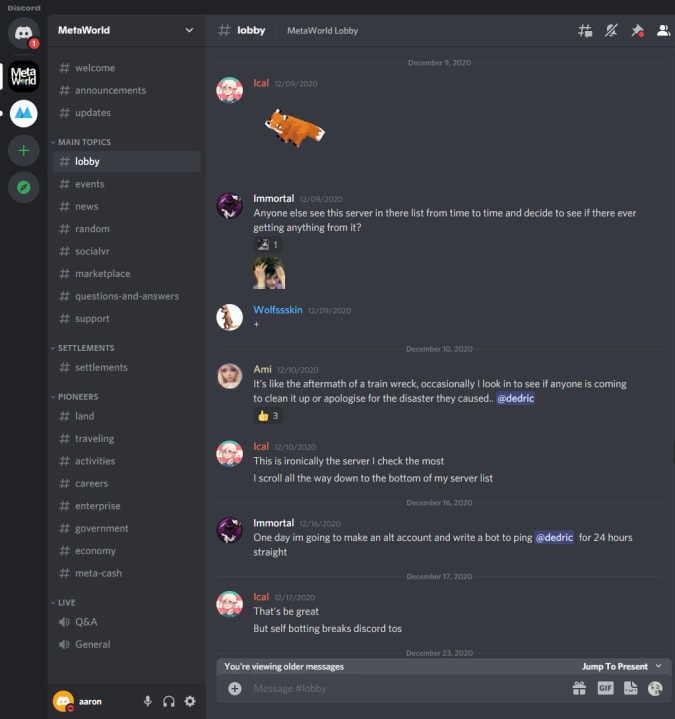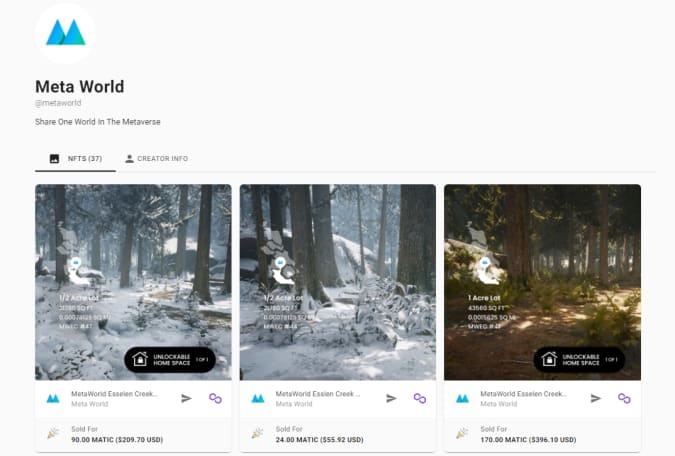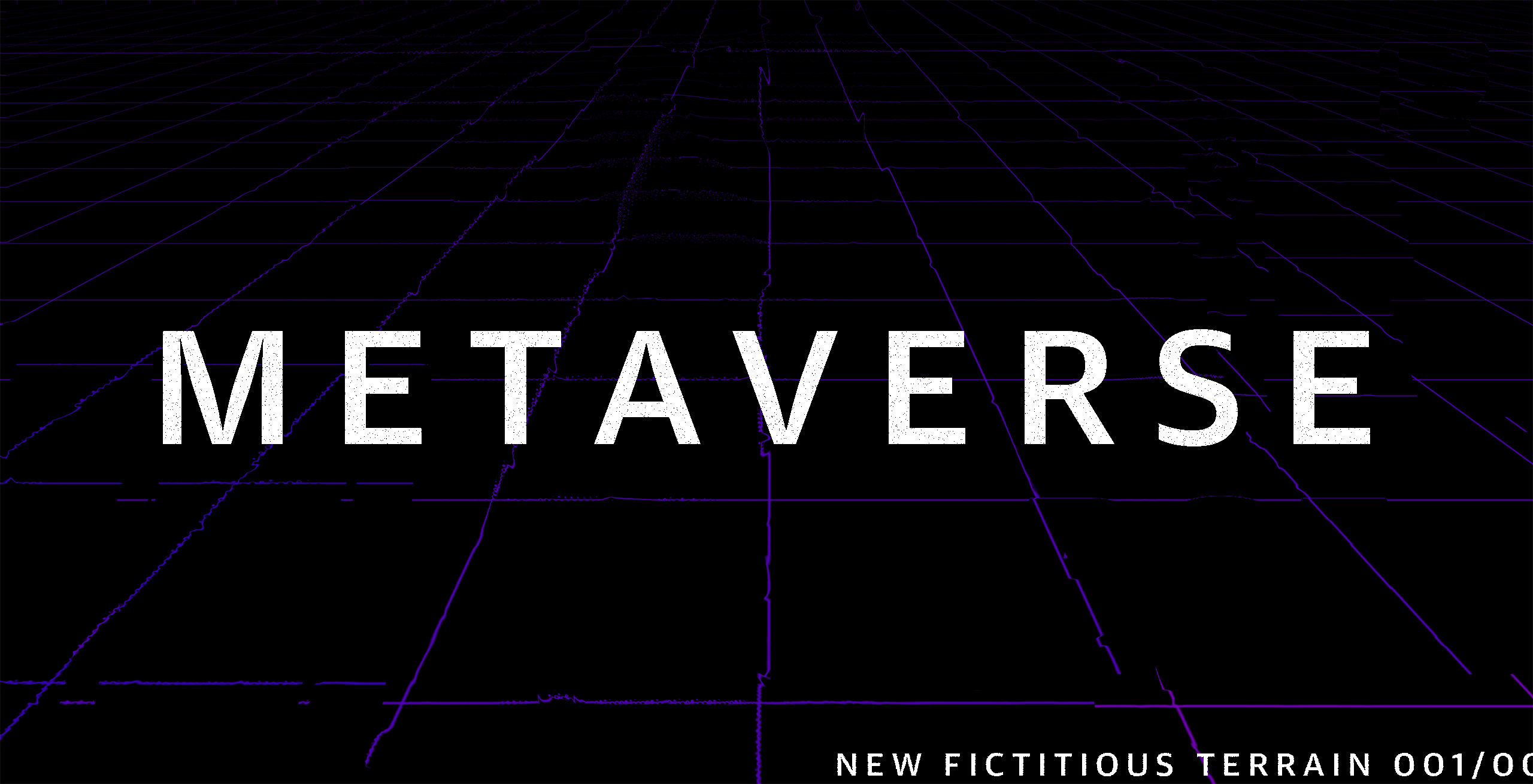How a VR startup took the money and ran to the metaverse
Engadget first interacted with Reid in 2016, when a UK startup named Improbable arranged a meeting inside a MetaWorld prototype to demonstrate Spatial OS, the startup’s scalable server tech. Reid was one of several developers to make use of the company’s public SDK, and Improbable thought MetaWorld made an effective demo to promote its “open community platform.”
Shortly after the launch of that prototype, Improbable stopped promoting or mentioning MetaWorld at all. By 2017, questions were being raised about Reid’s ability to deliver on his ambitious promises, which included a custom avatar system, a living world as large as the state of Maryland, a virtual economy, rich environmental simulations and cross-platform capabilities for a variety of VR headsets.
Reid started an Indiegogo campaign in April 2017, a move that prompted his former business partner and MetaWorld prototype developer, Carelton DiLeo, to publicly distance himself from the project. DiLeo noted that he was “not currently working on MetaWorld” and didn’t know how Reid planned “to deliver on the promise of the fund.”
The Indiegogo campaign was not a success, eventually raising $3,674 of a $50,000 flexible goal, meaning Reid got to keep all of the money pledged. This was followed by a new revenue-driving initiative: land speculation. In September 2017, Road to VR noted that Reid was selling virtual land for real money, and detailed the many questions surrounding the project. Land was available to buy in three tiers, ranging from $15 for a quarter acre to $100 for two acres, though it was unclear what exactly players would do with this property, how the economy would function or how people who didn’t buy land would join the game.
MetaWorld was listed on Steam as an Early Access title in mid-2017, advertising consistent updates and transparent, community-driven development. There was no actual game to play, no virtual world to explore, but Reid was selling land in MetaWorld regardless. On September 28th, 2017, a blog post in the MetaWorld Steam community claimed land titles were being sent out to investors, supported by a cryptocurrency Reid had created called MetaCoin.
In its September 2017 article, Road to VR concluded, “MetaWorld is headed into Early Access, which partly excuses it from being an incomplete product, but the inconsistency in messaging around the game’s core mechanics and features ought to leave you worried about the stability of the still unreleased MMO.”
By early 2018, Reid claimed he had been investing in crypto for several years to form the economy of MetaWorld, using the cash from early land sales to build the MetaCoin fund. He said he wasn’t personally making any money in the process, and all of the money coming into MetaWorld was being converted into cryptocurrency and kept in a single place called the Metabank, where it was reserved specifically for this new virtual economy.

MetaWorld
Reid told Engadget in 2018, “We’re a community-funded entity. So we’ve been working on that, in fact taking on cash and kind of forming it into cryptocurrency, and building an economy.” He said he was using “robo-trading, a couple different investment tools to grow the money.”
Roughly a year after saying that, Reid left his final message in the original MetaWorld Discord and disappeared from the server.
A few weeks after Reid’s quiet exit, a user named Immortal posted in the lobby, “Been a while since I’ve heard anything on this game and even longer since my money was happily taken for it. Anyone know anything about this release or is this just one of those things that never happen?”
“I don’t expect anything to happen,” a user called Myrothas replied. “Asked for a refund a year ago and many times. All I heard was: send me a mail. I did do that multiple times and never received an answer. Quite the red flag for me.”
Myrothas, real name Johannes Fischer, shared with Engadget a 2018 email exchange where he requested a refund through the MetaWorld help channel. “Backed this project about a year ago and expected it to come out already,” he wrote in the email. “I’d like to ask for a refund.” He says he never received his money.
Engadget interviewed Reid twice in 2018. In these interviews, Reid explained how paying customers would build MetaWorld themselves, and how cryptocurrency would make the whole thing work as a decentralized, libertarian dreamscape. With players responsible for funding and developing MetaWorld themselves, it was difficult to pin down what exactly Reid was selling.
One year after the launch of his crowdfunding campaign, Reid said he had “a design worked out in Unity” for MetaWorld, and he planned to transfer this into the existing Spatial OS ecosystem — even though Improbable, Spatial OS’ parent company, wasn’t actively supporting the project any longer. He claimed he’d built a procedural terrain generator for VR and also a robust avatar system with “head tracking, eyes, eye blinking, eye gazing, lip sync, upper torso support,” though these features weren’t ever demonstrated.
Most of Reid’s goals never materialized. The MetaWorld release date was pushed back again and again, until eventually the Steam page simply read, “Soon.” Reid showed off high-fidelity environments on YouTube and Discord, and then later revealed MetaWorld would be a Google Blocks project, making those assets impossible. MetaWorld never went live.
“We had a lot of broken promises right off the bat, that was a pretty major flag,” one early adopter told Engadget under the condition of anonymity. We’ll call them Morgan. “And the community was very quick to do some snooping.”
Engadget spoke with 11 original MetaWorld investors, including people who were deeply involved in the community and often interacted with Reid directly. Many of these members asked not to be named, considering Reid had their personal information and they didn’t trust him to not misuse it.

MetaWorld/Discord
After a few months of missed launch dates and hollow promises, MetaWorld members discovered Reid was using images from 3D model site TurboSquid to sell land and in-game items, and they said he changed critical details about the engine and development process seemingly on a whim. As people would ask for refunds in the original Discord server, Reid would call them trolls and delete their messages.
At the time, as calls for refunds were flooding the MetaWorld community, Reid told Engadget he was “in the process of coming up with a better refund policy” and he wanted to honor these requests, but it was difficult to do so without seriously affecting development. Not that Reid planned on doing much development himself — as he described it, he was a designer, the guy with the vision. According to his plan, the community would do the actual coding and game-making, after buying their way into MetaWorld.
“It was around then that we learned that users would also be responsible for creating assets,” Morgan said. “Assets included anything from buildings to animals… but we’d also be responsible for creating jobs, and performing said jobs to earn currency on the blockchain.”
Besides that, Reid told Engadget he planned to piggyback off the work happening at multibillion-dollar companies like Facebook, IBM and Google. He pointed out that these organizations had already built VR worlds, avatar systems and AI frameworks, and he said he’d simply use these to create MetaWorld. He seemed unconcerned with the concepts of intellectual property and trade secrets.
“From my perspective, all code is done and written,” Reid said. A few minutes on, he continued, “The code that drives the artificial intelligence — Watson, or just name your AI code — it exists, right? So I can play with concepts, whereas code’s already written, right? You know what I mean? I can take from any code set I want. And I think by understanding code — I also write code. But rather than get heads down on writing code, I sort of enjoy dreaming up concepts and just understanding how things are put together.”
In the end, Reid was basically selling an early-concept Roblox, in VR and for adults. But first, he was asking players to build the game itself and pay him for the privilege. After all, he said, actually making MetaWorld was the easy part.
“This stuff is like, it isn’t rocket science,” he said. “It’s really pretty straightforward to throw a couple objects around and create a couple simulations, a couple VR simulations and put them together. That’s not the hard part, like, making some VR games.”
That rudimentary 2016 demo, built before developer DiLeo left the team, is the only public proof that Reid’s MetaWorld has ever existed as an inhabitable virtual place. DiLeo went on to build his own simulated environment using Spatial OS, and he sold it in October 2018 to Somnium Space, which is an established, decentralized VR platform powered by blockchain. As part of that deal, Somnium Space offered a refund and land-exchange program for angry MetaWorld customers, in an effort to rebuild trust in VR development as a whole.
In October 2021, two years after Reid’s final message in the old Discord, a new MetaWorld server appeared. It had a fresh logo, links to his Clubhouse group, and the same pitch as before. A “passports” channel linked to a page where people could pay $10, $20 or $30 for “exclusive community access,” the opportunity to build MetaWorld, and early bidding on future NFT drops.
At the time of publishing, MetaWorld NFTs have raised 5,126 MATIC (around $11,000) since their launch on November 25th.

MetaWorld/Niftykit
Reid is now selling virtual land and properties as NFTs on the Polygon network, and people are buying. Land tends to run from $50 to $600, payable in Polygon’s MATIC currency, while a “Piano House” costs $650 and seems to be available via cash payment only. The MetaWorld website claims just 10 of these houses will be minted and simulated.
“So much excitement, creative thoughts and passion for the future,” Discord user Clare Bratina wrote in the new MetaWorld server on November 25th. “Definitely backing the creators and looking forward to learning how to create in the metaverse and on metaworld.”
Every now and then in the new server, a random member will spam the channels with warnings claiming that MetaWorld is a scam, and Reid will deny it and delete the messages. Just like old times.
There is one new, unexpected feature of the revamped MetaWorld campaign: Reid, who happens to be Black, is targeting people of color.





